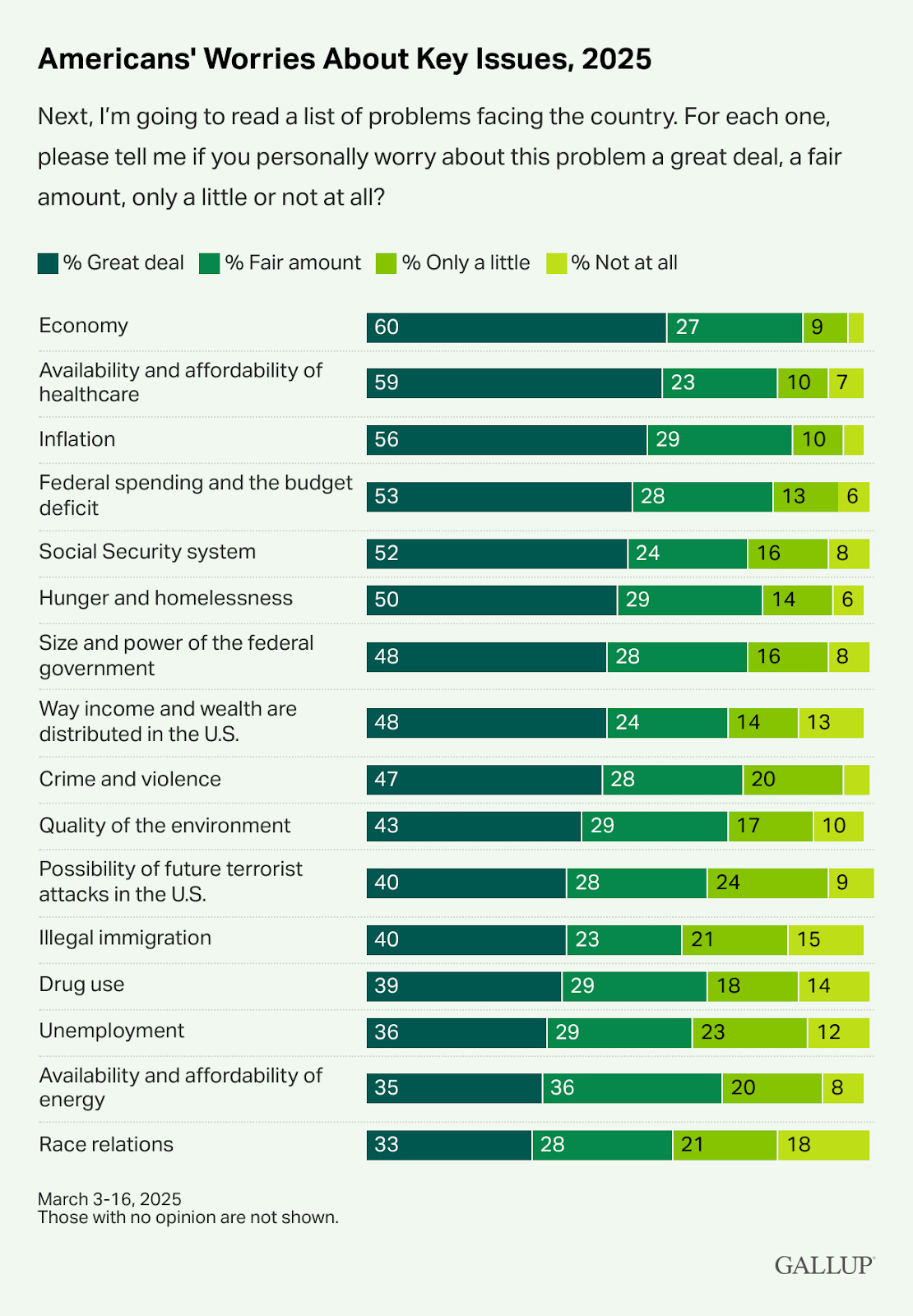Democrats, Practice Your ABCs
Affordability, Borders, and Care — and not much else.
"People think focus means saying yes to the thing you’ve got to focus on. But that’s not what it means at all. It means saying no to the hundred other good ideas that there are.
"You have to pick carefully. I’m actually as proud of the things we haven’t done as the things we have done. Innovation is saying ‘no’ to 1,000 things."
-- Steve JobsIt is tough to stay focused in politics. Clarity in values, policy, and messaging is a virtue that fades as campaigns get underway and dissolves entirely when governing begins.
The Democratic party is built on coalitions. It faces pressure to solve dozens of problems simultaneously. But voters don’t think in 50-point plans. They vote based on pain points: can I afford the rent, is my neighborhood safe and ordered, can I take care of my family?
What Voters Care About
These concerns have not changed much in five years. The same issues rise to the top: inflation, health care, the economy, government deficits, and Social Security. Immigration polls more variably, but it’s a top-tier concern among independents and Republicans.1
Trump Republicans aren’t addressing core voter concerns. They talk populism but deliver plutocracy. They have no viable plan to save Social Security or reform health care. Their tariffs raise prices. They are about to slash Medicaid to fund tax cuts for people who do not need tax cuts. Because this will add another $4 trillion to our $36 trillion in national debt, Moody's joined the other credit rating agencies and downgraded the US credit rating. This raises our borrowing costs.
Too often, Democrats aren’t talking to voters’ concerns either. Instead, they’re talking to each other. They are rallying for the climate. Or democracy. Or racial justice. Or immigrant or trans rights. Or against the oligarchy. Or high tech. Or DOGE. This is understandable. Climate, democracy, and rights are important and worth fighting for. DOGE is nuts, and tech bros are irritating. But Americans are complaining that their backs hurt, and Democrats are offering to check their cholesterol.
That’s how parties lose elections. Candidates do not win by solving every problem, but by solving the right ones, in ways that voters can feel, smell, and taste. For Democrats, that means doing something hard: sharpening the focus. It’s time to practice their ABCs.
A is for Affordability
Affordability is an almost universal anxiety. We worry about pay, rent, child care, gas, food, and medicine. Affordability cuts across class, race, and geography. And it's what Americans are desperate to hear about. Democrats need to lead with affordability every time they open their mouths.2
Secure, growing incomes. The US should mandate wage bargaining for low-wage sectors. We should pay for 14 years of education. We should also subsidize relocation from low-productivity, low-wage regions to those that pay more.
Affordable energy: Cheap energy reduces inflation, improves the quality of life, and powers innovation. Democrats should back affordable energy, whether solar, wind, nuclear, or domestic oil and gas in transition. Renewables are winning because they’re cheap, not because they’re subsidized or morally superior. Copy oil-rich Texas and let them win.
Affordable housing: HUD data show that the US has a shortage of 3.8 million homes. Rents have surged 30% in a decade. The federal government should reward cities that legalize density and penalize those that block housing. Let communities negotiate density tradeoffs.
Affordable health care: Federal spending pays for one-third of all health care expenses. Medicare, Medicaid, CHIP, VA, and ACA subsidies are the backbone of the system. Democrats should make it work better, not just defend it. Demand price transparency. Break up hospital monopolies. Negotiate drug prices more aggressively. Offer universal catastrophic coverage and free preventive care — they are cheap.
Stable prices. The budget deficit is inflationary, and any party that wants to build an electoral majority needs to say so. Dems should attack and repeal the Trump tax cuts. End step-up in basis at death, which the Congressional Budget Office says could raise $105 billion over 10 years. Remove the payroll cap, which solves 70-80% of the Social Security funding gap and only affects people earning more than $175,000/year. If Bill Clinton could balance the budget, today’s Democrats can too.
B is for Borders
B is not for Biden, who fell asleep on the border question. Joe was an outstanding two-year president. He was a lousy four-year president, and he forfeited his place in history by trying to become an eight-year president and electing Donald Trump.
Countries without borders are not countries. For this reason, most Americans aren’t anti-immigrant; they’re pro-border. They’re asking a simple question: Does the border mean anything? Democrats need to own an immigration policy that works:
A high-skill, points-based visa program like Canada’s that encourages scientists, entrepreneurs, students, and scholars who contribute vastly more than they cost.
A point system prevents lopsided immigration from distorting labor or housing markets.
Temporary regional visas for states that need particular categories of labor.
Expedited asylum processing, tied to enforcement.
Biometric E-Verify to enforce employer accountability.
This doesn’t require cruelty; it requires clarity. Democrats cannot support robust legal immigration without also supporting a robust border defense.3
C is for Care
The party that talks most about care often forgets to simplify it. Voters want health care that never bankrupts them, child care that lets them work, and support for vulnerable people who have no one else.
Health Care. Democrats should focus on ending medical bankruptcy by offering universal catastrophic coverage that caps out-of-pocket medical expenses. They can make all preventative care free — it literally pays for itself. They can break up regional hospital monopolies and leverage Medicare reimbursement to temper specialist compensation and capital spending. They can bargain prescription drug prices and invest in drug research.4
Child Care: The expanded Child Tax Credit cut child poverty by 46% in 2021. Bring it back. Make it permanent.
Homeless Care: The evidence for "Housing First" is overwhelming — building more housing must be a top federal and especially blue state priority. But shelter alone isn’t enough. Managed encampments, with hygiene, safety, and a range of services, have shown promise in Olympia, Washington, Portland, Oregon, and Los Angeles. These are not endpoints, but vastly better stopgaps than sidewalk tents.
Simplicity is Hard
The ABC agenda isn’t flashy. But it meets voters where they live. Executing it requires us to attract talented professionals into government, pay them well, and tolerate much more risk (meaning more failure). It requires a tamed DOGE that can promote excellence, consolidate massively redundant federal programs, and only then use technology to deliver services faster and at lower cost.5
It also means saying no to populist distractions. No to regressive EV and student debt subsidies. No to performative DEI litmus tests that alienate more than they include. No to pretending that tariffs help the working class when they hurt consumers, most workers, and exporters.
Above all, ABC means Always Be Campaigning—not for slogans, but for solutions. Build a story around affordable living, secure borders, and compassionate care. Repeat it. Fight for it. Live it.
The American people are listening. Do Democrats have the discipline to seize the opportunity?
Musical Coda
You got a fast car
I want a ticket to anywhere
Maybe we can make a deal
Maybe together we can get somewherePew Research (2024): 73% of Americans say strengthening the economy should be a top priority, 61% cite reducing health care costs, and 57% cite inflation. Only 39% name climate change. Democracy ranks higher, but more in the abstract than in lived experience.
Gallup (2024 - shown): Economic issues, inflation, and immigration dominate. Concerns over moral decline and the government itself show up frequently, too.
“Affordability” communicates more than “abundance”. Everyone understands affordability, but only those who read the excellent book realize that the two are close cousins.
Historically, Democrats have done plenty of border enforcement. Obama deported more people each year than Trump did, and Bill Clinton apprehended about double the number of people Obama did. (These numbers are not strictly comparable, since the number of people attempting to enter the country illegally varies enormously.)
This is a complex topic. First, even expensive drugs are super cost-effective. By one estimate, modern drugs save an additional (marginal) life for only $2,800. Nonetheless, Medicare spends over $160 billion annually on pharmaceuticals for elderly Americans, making it an obvious target for federal budget cuts. And prescription drugs are often far cheaper overseas, which infuriates consumers. Trump’s proposed price controls discourage drug innovation at the exact moment when AI appears poised to accelerate pharma innovation by streamlining drug discovery, clinical trials, and regulatory approval. We should bargain prices, match private investments in drug discovery, and undertake patent and other reforms to promote competition and transparency. But caution: it is easy to get this wrong, and policymakers will never know how many lives they shorten.
The GAO finds that the US has 40+ workforce programs across 9 agencies, more than a dozen food assistance programs, and at least 20 housing assistance efforts spread across HUD, USDA, and the VA. Streamlining isn’t just about efficiency — it’s about clarity. If voters can’t name what you’re doing for them, they won’t vote for it.



This is very good. However, it requires real discipline, including a confident break from past rhetoric. For example, on affordability, Democrats have fumbled the issue of stable prices many times. They revert to "price gouging" (e.g., Kamala blamed inflation on price gouging by grocery stores) and "market manipulation" (e.g., every time gasoline prices go up because the global price of oil increases, the domestic oil companies are investigated (especially in CA)). From a political perspective, a broad base of voters will have to be convinced that when Democrats advocate affordability, they don't mean economic nonsense like price controls and profit caps.